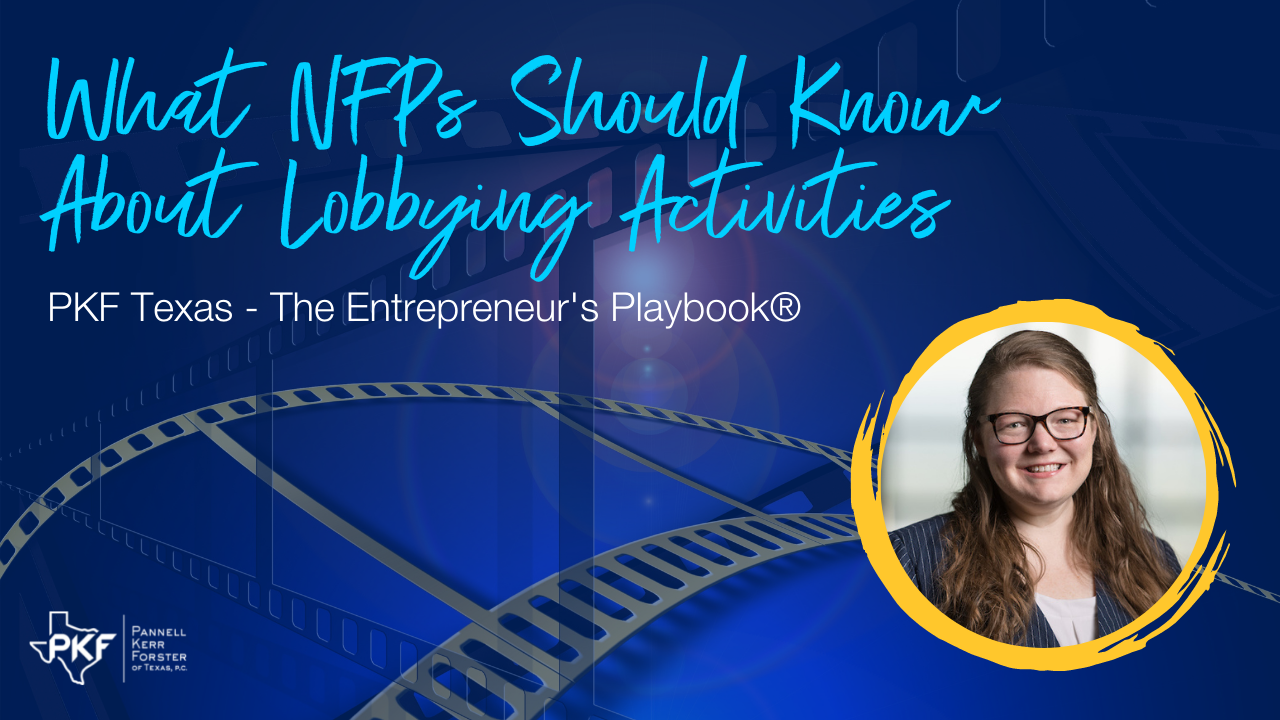What NFPs Should Know About Lobbying Activities

It’s election season, and there are lobbying activities your not-for-profit should steer away from. What precautions should your organization be aware of? Jen Lemanski sits down with PKF Texas Tax Director Emily Smikal, CPA, about the details.
Jen: This is the PKF Texas – Entrepreneur’s Playbook®. I’m Jen Lemanski and I’m back again with Emily Smikal, a Tax Director and one of our Approachable Advisors™ here at PKF Texas. Emily, welcome back to the Playbook.
Emily: Thanks for having me.
Jen: So, in this day and age with a lot of things going on in the government, not-for-profit organizations might want to influence legislation in some manner. Are there any restrictions on this type of activity?
Emily: Yeah, it’s a good and timely question, Jen. And what you’re referring to is called lobbying, and lobbying occurs when an organization contacts a member of a legislative body to try to propose or support or oppose a certain legislation. It could even be by trying to call the public to action against a certain organization or for a certain legislation. So, a 501(c)(3) organization… they can be involved in some lobbying activities, but they definitely need to be careful on the amount because too much could put their tax-exempt status at risk and it can result in penalties.
Jen: That’s really interesting. Is there anything that an organization needs to watch out for?
Emily: Yeah, so they really need to make sure that they avoid what the IRS calls a substantial amount of their activities being involved in lobbying. So, there’s a couple of tests the IRS uses to measure this. One test measures the amount of time devoted by both their paid workers, as well as their volunteer workers, to lobbying activities, as well as the amount of expenditures going towards lobbying activities. Another test limits the amount of lobbying expenditures based on the total amount of expenditures by the organization.
Jen: So, what would happen to an organization if they didn’t pass those tests?
Emily: Well, depending on which of the tests is used, the consequences and the timing of the consequences could vary, but ultimately it could lead to revocation of their tax-exempt status, it could lead to taxation of the organization’s income, and/or excise tax on the expenditures spent on lobbying activities.
Jen: So, is this something that an organization would get us involved to provide any kind of advice on if they think they’re getting close to that line? Or what would you recommend?
Emily: Any organization that is involved in any sort of these activities and if they would like to know where it may fall, they should definitely reach out to us. And one other thing I really want to point out is that any political campaign activity is completely prohibited for a 501(c)(3) organization. So, this could mean endorsing any sort of political candidate making contributions to a political candidate or supporting or opposing political candidates. So, those are completely prohibited.
Jen: Good to know. All right, well, we’ll get you back to talk a little bit more about some more not-for-profit topics. Sound good?
Emily: Sounds great. Thank you.
Jen: This has been another thought leadership production brought to you by PKF Texas – The Entrepreneur’s Playbook®. For more information about this and other topics, visit www.pkftexas.com/NotForProfit. Tune in next week for another chapter.

